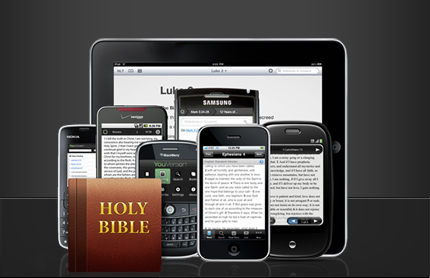Apps and Spirituality? The Blend Can be a Mixed Blessing, Baylor University Author Says

Follow us on Twitter:@BaylorUMediaCom
Contact: Terry Goodrich, (254)710-3321
WACO, Texas (Dec. 11, 2011) -- Smartphone apps that deliver everything from sacred Christmas music to reminders to attend worship to Scriptures for meditation can be potent tools for spiritual growth, but such technology also has potential to diminish worship and fellowship with other believers, says a Baylor University associate professor of philosophy.
Douglas Henry, Ph.D., who teaches in Baylor's Honors College, addresses the issue in "Curiosity and Smartphones," an article in Christian Reflection, a quarterly publication of The Center for Christian Ethics at Baylor University.
Henry has the BibleReader app on his phone and uses it to read the King James Version of the Bible, the English Standard Version and the Latin Vulgate. He also has the Universalis app, with prayers and meditations for various times of the days and special religious seasons such as Advent, and he acknowledges that iPads, netbooks and smartphones can be put to good spiritual use.
"Especially when traveling, I use my iPad to search, read, and study Scripture. . . . It gives me pictures of nature and works of art that . . . inspire my contemplative gratitude to God," he writes. But "living in a world of perpetual mobile connectivity can be spiritually distracting, and even deforming, for those who succumb to its inducements . . . Whatever technology's wizardry does for us, it cannot fundamentally alter our heart's desire to love God and to love others in God."
There's the temptation to love technology too much, Henry said.
"We can be the quickest on the draw to find the latest bit of gossip or news -- but there is also an impatience we're cultivating, a desire to get instant answers and solutions. Christians are called to be pilgrims, a people who walk patiently in faith toward an end that God prepares for us."
From a Christian standpoint, too, "the Bible is a gift from God to be shared ," Henry said. "But what if it's a Bible app on your phone? What if someone sitting next to you says, 'I forgot my Bible. Can I borrow yours?' We think of a cell phone as something we keep away from others. There's too much information there -- bank accounts, purchasing accounts, email accounts. We easily become possessive about something intended for sharing."
A smartphone or other technological device used during worship also can distract oneself -- or others.
"If you turn on your smartphone, your neighbor may wonder whether you're using it to read Scripture or whether you're playing solitaire," he said.
When Henry goes to church, he takes his printed Bible, leaving the cell behind.
"It's not because I'm old-fashioned and want to turn the pages -- although I do have an affection for books," he said. "But smartphones can be a communication device for trading in frivolous gossip or delivering the most tragic news of destitution and desolation. Something doesn't seem quite right about bringing it in the space of Christian worship. Of my printed Bible, however, I know that it is always and only the Bible."
ABOUT BAYLOR
Baylor University is a private Christian university and a nationally ranked research institution, classified as such with "high research activity" by the Carnegie Foundation for the Advancement of Teaching. The university provides a vibrant campus community for approximately 15,000 students by blending interdisciplinary research with an international reputation for educational excellence and a faculty commitment to teaching and scholarship. Chartered in 1845 by the Republic of Texas through the efforts of Baptist pioneers, Baylor is the oldest continually operating university in Texas. Located in Waco, Baylor welcomes students from all 50 states and more than 80 countries to study a range of degrees among its 11 nationally recognized academic divisions.
ABOUT THE COLLEGE OF ARTS & SCIENCES
The College of Arts & Sciences is Baylor University's oldest and largest academic division, consisting of 27 academic departments and 13 academic centers and institutes. The more than 5,000 courses taught in the College span topics from art and theatre to religion, philosophy, sociology and the natural sciences. Faculty conduct research around the world, and research on the undergraduate and graduate level is prevalent throughout all disciplines. Visit www.baylor.edu/artsandsciences
Baylor News
Follow us on Twitter
Contact: Terry Goodrich, Assistant Director of Media Communications, (254) 710-3321